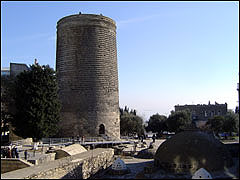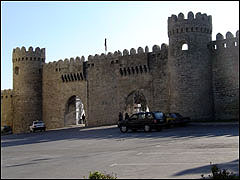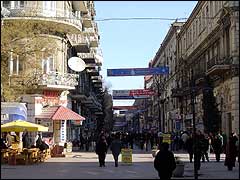 ODLAR
YURDU - COUNTRY OF FIRE. HISTORY OF
THE COUNTRY ODLAR
YURDU - COUNTRY OF FIRE. HISTORY OF
THE COUNTRY |
Already 1,5 million years ago first groups
of people appeared in Azerbaijan. First
arch-state in the territory of Azerbaijan
was Manna kingdom that established in IX
century B.C. At the beginning of VI century
B.C. one of the strongest states of antiquity
- Midia - replaced Manna. The official religion
of Midia kingdom was zoroastrism - fire-worship,
one of this religion was Zoroastr or Zardusht.
He was preaching three main principles -
kind thought, kind word, kind deed. The
fire was a symbol of purity of the thoughts
and mental intentions. In the old language
"azer" means fire and no other
name seems more suitable to this land. Even
nowadays, the fire is a part of country
symbols. An ancient fire-worship temple,
Atashgah, has been maintained near Baku.

After destroying the Persian Empire, the
southern part of Midia stood for the independent
state of Atropatena. The Arabs renamed "Atropatena"
in the middle centuries to "Azerbaijan",
so the current name of the country had appeared.
Religion in Atropatena was zoroastrism with
the head temple in the city of Gazaka. The
state of Caucasian Albania appeared in the
north, the official religion of which had
become Christianity in V century. An alphabet
consisting of 52 letters appeared at the
beginning of V century. Atropatena and Albania
were playing an important role in unification
of the tribes living in the territory of
Azerbaijan. To all appearances, the common
language was the one which had become known
as Azeri. Then, Alban tribes and other ethnic
groups entered the forming nationality in
Azerbaijan.
Azerbaijan was exposed to the invasion
by foreign occupants. The sasanids seized
its part in the middle of III century that
became a strong state in Iran. The territory
of Azerbaijan had become an arena of the
devastating wars between the Roma Empire
and what would become known as Iran in IV
century.
In the middle of VII century, Azerbaijan
was exposed to the invasion of the Arabic
caliphate. The arabic caliphate conquered
Azerbaijan at the beginning of VIII century.
The province of Arran was founded in the
territory of Azerbaijan. Islam had become
the leading religion in Azerbaijan creating
new traditions and culture. The same as
other nations, the Azerbaijanis adopted
Islam and took part in the development of
Muslim culture under the common name of
"Muslims". Azerbaijan enriched
the world culture, having given a brilliant
gallery of scientists, poets and architects.

As in other Caucasian countries, Azerbaijan
had become free from the caliphate ruling
by late IX and early X century and was living
through the period of the economic prosperity.
Agriculture, handcrafts and trade were developing
and the cities were growing. A number of
local states had formed. The most considerable
was he state of Shirvanshahs with the capital
in the cities of Azerbaijan. Its founder
was Ildegiz, who was one the deputies of
the Seljuk sultans, who turned regions ruled
by governor intoheritage property and expanded
it having adjoined neighboring lands. In
the XI - XII centuties with the establishment
of the Turkic language in Azerbaijan, the
formation of an Azeri nationality started.
At the same time, grand material and spiritual
treasures were being established by the
creative genius of the nation. Eminent scientists
Makki ibn Ahmad, Bahmanyar, poets - thinkers
Khatib Tabrizi, Khagani, Nizami Ganjavi,
poetess Mahsati Ganjavi etc contributed
largely to development of Azeri and world
culture.
This period of economic and cultural development
of Azerbaijan was terminated in the early
part of the XII century by Mongolian invasion.
Prosperous cities were turned into ruins.
Azerbaijan had become and object of the
seizing campaigns of Timur since late in
the XIY century. In early XYI century the
state of the Sefevids made its capital in
the city of Tabriz. This united all Azeri
lands in one state for the first time in
the history of Azerbaijan, which by then
had become a powerful empire founded on
huge territory from Sirdarya to Yevfrat.
Its founder was shah Ismayil I (reigned
inthe years of 1502-24). Unification of
the country promoted the development of
agricultural and cultural life and ignited
up the fight of the nation against foreign
seizures.
|
In the middle
of XIII century, independent states-khanates
were established in the territory of Azerbaijan.
Baku, Sheki, Nakhchivan, Garabag, Ganja, Shamakhi,
Guba, Urmiya, Irevan, Tabriz, Maraga and other
khanates were established.
Historical conditions of XII-XYIII century
found their reflection in the culture of
Azerbaijan as well. An eminent monument
to the national artwork is the heroic epos
"Kor-oglu". After seizure of the
northern part of Azerbaijan by Russia and
conclusion of the Gulustan (the year of
1813) and Turkmenchay (the year of 1828)
agreements between Russia and Iran, Azerbaijan
was divided: Northern Azerbaijan was to
the tsarist Russia and Southern Azerbaijan
- to Iran. Therefore, the Azeri nation was
divided into two parts. After that, the
displacement policy of tsarism tended to
strengthen in Caucasus and Asia Minor basing
on Armenian population.
In spite of the colonial policy of tsarism,
Azerbaijan was spared the destroying invasions
from outside, domestic feudal intestine
was and fragmentations. The first large
industrial enterprises appeared. In 1872,
all the conditions were established for
the rapid development of the oil industry
in Baku.
After the development of the tsarist regime
in 1917, the political situation in Azerbaijan
changed. Northern Azerbaijan reestablished
its sovereignty on May 28, 1918; the state
with the republic mode established for the
first time among the Muslim countries.
Soviet Russia breached state sovereignty
of Azerbaijan in April 1920 and sent the
11th Red Army to Azerbaijan. On April 28,
1920, Soviet power was announced in Azerbaijan,
and Azerbaijan became part of the Soviet
Union.
The independence of Azerbaijan was reestablished
in 1991. A new stage in the history of Azerbaijan
started after Heydar Aliyev returned to
the republic government. The domestic situation
in the stabilized; growth in all friends
of the national life started. Azerbaijan
continues to develop stably and has potential
to become one of the most interesting centers
of tourism for foreign guests and good-nature.
Azerbaijan has all opportunities for it:
historical traditions, architectural-art
legacy of various epochs, soft climate,
and magnificent nature.
 The
country today The
country today |
Being country with the transitional economics,
modern Azerbaijan is at the stage of the
intensive development, confirmed by statistical
indexes of the republican economic growth
rates. The government constantly realizes
the programs aimed at the establishment
of the favorable legal and economic conditions
for the development of the small, medium
and large business, attraction of the investments,
contribution of the modern technologies
in the production, development and strengthening
financial and banking system as basis of
the stable and forward development of the
country.

Azerbaijan was and remains an oil-producing
country. Intensive development of the oil
industry, existence of huge oil and gas
deposits, oil contract signed in 1994 with
the leading world companies have companies
have given opportunity to start realization
of the largest projects on construction
of a pipeline for the oil transportation
via the Baku-Tbilisi-Ceyhan route. Hard
work in the oil sector gives impulse to
the development of the infrastructure in
many other fields.
At present, dozens of authorized companies
from the USA, Great Britain, Germany. France,
Russia, Japan and many other countries realize
their business in Azerbaijan. Big investments
in the country economics are put by IMF,
EBRD, World Bank.
Local businessmen adopt modern style and
methods of management. Many changes take
place in the field of education, science
and medicine. New schools, medical institutions
functioning according to the western standards
have been opened.
Representatives of science, culture and
art have many opportunities for wide and
free communication with the colleagues from
the other countries and travel there for
work.
Azerbaijan actively cooperates with many
international organizations confirming its
desire to participate firmly in the implementation
of humanitarian tasks, which are key to
the social, moral and spiritual development
of the nation. Azerbaijan became a full
member of the Council of Europe since 2001.
The Republic participates in the project
of the renaissance of the route of Great
Silk Road within the framework of the TRACECA
program, which will connect China with France
reviving the ancient trade ties along the
caravan routes.
|

